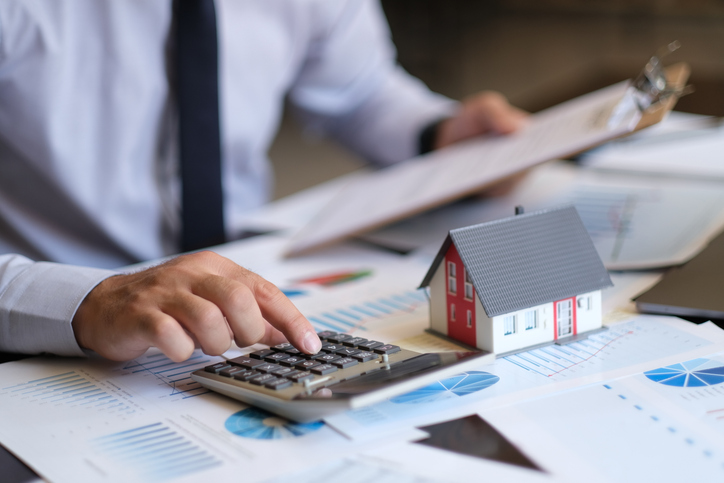Capital gains tax (CGT) is the tax you pay on the profit when you sell a CGT asset, such as property. When you sell a property for more than you paid for it, the gain is part of your taxable income for the year, unless you qualify for an exemption such as the main residence exemption.
Will I Pay Tax If I Sell My Property or House?
.jpg)
Typically, when you sell an asset you must pay capital gains tax (CGT) on any profit made on the sale. For most of us, the most valuable asset we own is our family home . So, does that mean that you have to pay CGT when you sell your house?
Fortunately, in most cases, the answer is no. The tax law provides an automatic exemption for any capital gain (or loss) that arises from the sale of a taxpayer's main residence. However, this isn't a blanket exemption. There remain situations where some or all of the gain arising on disposal of your main residence may be liable for CGT.
What Is Considered Your Main Residence for CGT in Australia
In short, it's your home. The ATO has set out some of the factors that determine whether the property you have disposed of is your main residence. These include whether:
- You and your family live there
- You have moved your personal belongings into the home
- This is the address to which your mail is delivered
- This is your address on the electoral roll
- The property is connected to services and utilities (for example, phone, gas, or electricity)
- You actually occupy the dwelling.
There is no minimum time that you have to live in a home before it can be considered to be your main residence. Even if you only own a house for a short period – six months, say – provided you tick all the boxes above, the property will be your main residence.
If you live on a large block, the CGT exemption normally only applies to the house and land (including the land on which the house sits) up to a maximum of two hectares. The main residence exemption also only applies to a property that includes a dwelling, which is anything used wholly or mainly for residential accommodation.
Examples of a dwelling are:
- A house or cottage
- An apartment or flat
- A strata title unit
- A unit in a retirement village
- A caravan, houseboat or other mobile home.
Simply owning land isn't enough to claim the exemption, even if you intend to build a dwelling at a later date. However, you can choose to treat land as your main residence for up to four years before a dwelling is constructed in certain circumstances. You can choose to have this exemption apply if you acquire land and you:
- Build a dwelling on the land
- Repair or renovate an existing dwelling on the land, or
- Finish a partly constructed dwelling on the land.
There are a number of conditions you must satisfy before you can claim the exemption. You must first finish building, repairing or renovating the dwelling and then:
- Move into the dwelling as soon as practicable after it is finished, and
- Continue to live in the dwelling as your main residence for at least three months after it becomes your main residence.
Can You Have More Than One Main Residence for CGT Purposes?
You can only ever have one main residence at any given point in time. The exception is if you're selling your old property and buying another. In this case you're entitled to an overlap period of six months when both properties can be your main residence as long as:
- The new property will be your main residence after the sale of the old property
- You lived in the old property for at least three continuous months in the 12 months prior to sale, and
- The property wasn't used to generate rental income in any part of the 12 month period that it wasn't your main residence.
What Happens to CGT If You Can No Longer Live in Your Main Residence
The main residence exemption can also apply where the owner is no longer able to reside in the dwelling, because they have lost the ability to live independently and require full time care. This ensures property owners who spend an extended period in hospital, or must relocate to a residential care facility, or who relocate to live with a caregiver, can still access the main residence exemption when they sell the property to pay living and medical expenses.
Can You Move Out and Still Claim the Main Residence Exemption?
You do not need to live in the dwelling for the entire period of ownership for it to continue to qualify for the exemption.
If you own a property which is currently your main residence you can move out of the property and still get the exemption provided you do not treat another property as your main residence during the absence. If you earn income from the property (for instance by renting it), this exemption lasts six years. If you don't earn income from the property, the exemption is indefinite.
If you own two properties during the same period, both of which would qualify as your main residence, you must choose which one you will claim the main residence exemption for (unless the 6 month overlap rule mentioned above applies). The other property will be subject to capital gains tax. This choice does not need to be made until one of the properties is sold.
Does the Main Residence Exemption Apply to Property Renovators?
Possibly – provided you actually occupy the renovated property as your main residence, even if only for a short period.
If you purchase a property, occupy the dwelling while you are renovating it and then sell the property, any profit you make on the sale of the property may be tax exempt, although if you habitually repeat this ( "house-flipping"), the ATO may argue that you are actually a property developer and tax you on your profits as business income..
Can Foreign or Non-Resident Australians Claim the Main Residence Exemption?
Most individuals who are non-residents for tax purposes at the time they sell their home (ie the date they sign the sale contract, not the date of settlement), will no longer qualify for the main residence exemption from 1 July 2020.
The main residence exemption may however still be available for taxpayers who have been non-residents for tax purposes for a continuous period of six years or less when the house is sold, if certain "life events" happened.
The "life events" referred to are:
- The taxpayer, the taxpayer's spouse or child under 18 had a terminal medical condition (ie two medical practitioners certified that the illness will likely result in death within 24 months of this certification)
- taxpayer's spouse or child under 18 dies, or
- The sale of the home involved the distribution of assets between the taxpayer and the taxpayer's spouse as a result of divorce, separation, or similar maintenance agreements. For example, if the taxpayer has been a non-resident for six years or less when they sell their home and the sale happened because of a court order under the Family Law Act 1975 (arising from a divorce), the taxpayer would still qualify for the main residence exemption.
There are no partial exemptions for non-residents. Where a taxpayer has lived in their home as a main residence for a long time and has subsequently become non-resident before they sell their home, the taxpayer would not qualify for any main residence exemption at all. This is a very harsh outcome.
Where an individual returns to Australia and resumes Australian tax residency before entering into a contract of sale, they can still claim the main residence exemption. The period they spent overseas as a non-resident is completely overlooked.
How Using Your Home to Earn Income Affects the Main Residence Exemption
Some people use their home to produce income, either by renting out part of the property, or by running a business from home. If you tick one of those boxes, you may be forsaking part of your CGT exemption. This is because you can't typically obtain a full main residence exemption if you used any part of your home to produce income during all or part of the period you owned it.
People who simply work from home as part of their job (such as teachers who might do some marking in the evening or anyone else who might do a bit of overtime away from the office) are not affected.
If you are impacted by the exemption, either you or your accountant will need to calculate how much of the profit on disposal of your house is taxable. In most cases, this is the proportion of the floor area of the home that is set aside to produce income but it also takes into account the period the home was used to produce income. Generally, when calculating the capital gain, the cost base of the property will be the market value on the date it was first used to produce income, so it is important obtain a market valuation of the property on that date.
Here are some simple case studies to understand exactly how this works:
Using Your Home to Run a Small Business and CGT Implications
Greg runs an IT consultancy from home as a sole trader, in addition to his day job working in IT for a major corporation. He undertakes projects working largely in the evenings and at weekends and converts a spare bedroom in his three bedroom house into an office where he runs his business.
He bought his house in 2006 for $350,000 and sells it in the current tax year for $1,000,000. He estimates that approximately 10% of the floor area of the house is used in his home-based business. He commenced the business in 2011.The market value of the property that time was $500,000.
Ordinarily, the profit on sale of his house will be exempt from CGT. However, for five years of the ownership period, he used 10% of the property to earn assessable income, so Greg will not be entitled to the full main residence exemption. Greg's capital gain is calculated as follows:
Capital Gain = ($1,000,000 - $500,000) x 10% = $50,000
Greg will be entitled to the 50% CGT discount, so his taxable income will be $25,000.
This is a simplified example and does not take into account any additional costs Greg could include in the cost base of the property when calculating his capital gain such as costs incurred on the sale of the property, improvements to the property and other costs incurred (after he commenced his business) in relation to the property, provided he has not already claimed these as a tax deduction. These costs are applied before the gain is reduced by the 50% CGT discount.
Renting a Room Through Airbnb and the Main Residence Exemption
Jill bought a three-bedroom apartment in Sydney in 2010 for $300,000. To help pay the bills, in July 2019 she rented out one of the bedrooms through Airbnb. At the time the market value of the apartment was $400,000. She estimates that including access to shared areas like the lounge and kitchen, 40% of the floor area is given over to earning assessable income through Airbnb. In July 2021 she decided to stop renting the room and in July 2025, she sells the apartment for $800,000.
Ordinarily, the profit on sale of the apartment will be exempt from CGT. However for two years out of the six-year ownership period after she started renting the property, she used 40% of the property to earn assessable income. The capital gain on the sale of the property is calculated as follows:
$400,000 x 40% x 33.33% = $53,328
Jill will be entitled to the 50% CGT exemption, so her taxable income from the sale of the property will be $26,664.
This is a simplified example and does not take into account any additional costs Jill could include in the cost base of the property when calculating her capital gain such as costs incurred on the sale of the property, improvements to the property and other costs incurred (after she commenced renting part of her home) in relation to the property provided she has not already claimed these as a tax deduction.
Renting Out Your Entire Home While Temporarily Away and CGT Rules
Bob bought a house in Perth for $500,000 in 2005. In 2019, he was employed to work in the mines in a remote area of Western Australia. He was provided with rental accommodation in that remote area by his employer. Whilst away, he rented out his whole house in Perth. In 2023, he sold the house for $1,000,000.
Ordinarily, the $500,000 profit on sale of the house will be exempt from CGT and that is indeed the case here. Tax law allows you live away from your home and earn assessable income from renting it out for up to six years (the six-year absence rule) without losing the main residence exemption, provided you don't claim the main residence exemption for another property for the same period. As Bob lived in rented accommodation whilst absent, he can take advantage of the six-year rule and claim a full exemption from CGT on the sale.
Had Bob purchased a property to live in while he rented his original home, he would still have the option to use the main residence exemption on the original home. If he did so, for the period up to the date of sale of the original property, he could not claim the main residence exemption on the new property.
Selling Property After Moving Overseas: Australian CGT Rules
Vicki acquired a dwelling on 10 September 2010 moving into it and establishing it as her main residence. On 1 July 2018 Vicki vacated the dwelling and moved to New York. On 15 October 2022 Vicki signs a contract to sell the dwelling. As Vicki is a foreign resident on 15 October 2022, she is not entitled to the main residence exemption.
This outcome is not affected by Vicki previously using the dwelling as her main residence.
For more information, book an appointment with H&R Block.
Frequently Asked Questions
You generally do not pay CGT on the sale of your home if it qualifies as your main residence and you are an Australian tax resident. To qualify, you must have lived in the property as your primary home, it must not have been used to produce income, and it must be on land of 2 hectares or less.
The main residence exemption lets you exclude your home from CGT when you sell it, provided it has genuinely been your main residence. Factors the ATO considers include where you and your family live, where your mail is delivered, and where you are enroled to vote.
You may still qualify for a partial main residence exemption if you rent out your property or use part of it to produce income. In that case, the exempt portion is calculated based on the time and extent the property was your main residence versus income use.
If you move out of your home and rent it out, you can continue to treat it as your main residence for up to six years for CGT purposes. This rule allows you to potentially keep the CGT exemption even while earning rental income, provided you do not nominate another property as your main residence during that period.
Yes. The main residence exemption generally applies to your home and up to 2 hectares of land around it. If your property is larger than 2 hectares, you may choose which 2 hectares are treated as exempt when you sell.
You can only have one main residence at a time for CGT purposes. If you own multiple properties, you must choose which one to treat as your main residence when selling to qualify for the main residence exemption.
Under current ATO rules, foreign residents generally cannot claim the main residence exemption for properties sold after 30 June 2020, unless they meet specific life event conditions. Australian residents for tax purposes selling property are not affected by this foreign resident restriction.
Yes. Even if you qualify for the main residence exemption, you must report the CGT event in your tax return for the year the contract is signed or the property is sold. The ATO requires you to lodge the CGT event details when you prepare your individual tax return.

Still have questions?
We have the answers. Let us take care of you and your tax needs.




.png?width=55&height=48&ext=.png)
-1.svg)

